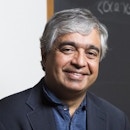Quantum Entanglement, Strange Metals and Black Holes
- Speaker
-
 Subir Sachdev, Ph.D.Herchel Smith Professor of Physics, Harvard University
Subir Sachdev, Ph.D.Herchel Smith Professor of Physics, Harvard University
Presidential Lectures are a series of free public colloquia spotlighting groundbreaking research across four themes: neuroscience and autism science, physics, biology, and mathematics and computer science. These curated, high-level scientific talks feature leading scientists and mathematicians and are designed to foster discussion and drive discovery within the New York City research community. We invite those interested in these topics to join us for this weekly lecture series.
Einstein apparently called it “spooky action at a distance.” Entanglement is a counterintuitive feature of quantum theory by which two particles can be correlated even when separated by vast distances, such that a measurement of one particle instantaneously determines the state of another. Remarkably, quantum entanglement can also happen en masse and determines observable properties of macroscopic objects.
In this lecture, Subir Sachdev will present a simple model of many-particle entanglement, which has led to new insights into two very different classes of systems. First, we have crystals of materials containing layered arrangements of copper and oxygen atoms. At low temperatures these materials exhibit superconductivity, the ability to conduct electricity without resistance. But at higher temperatures they exhibit a “strange metal,” which conducts electricity and heat in a novel manner linked to the collective quantum entanglement of the electrons. Second, we have black holes, astrophysical objects so dense that even light cannot escape past a horizon. Hawking argued that quantum entanglement can be present across the horizon, and this leads to radiation from the black hole. Remarkably, the simple model of entanglement leads to a common description of the physical properties of both classes of systems.
